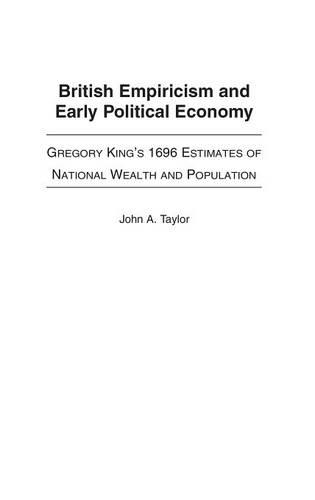
British Empiricism and Early Political Economy: Gregory King's 1696 Estimates of National Wealth and Population
(Hardback)
Publishing Details
British Empiricism and Early Political Economy: Gregory King's 1696 Estimates of National Wealth and Population
By (Author) John A. Taylor
Bloomsbury Publishing PLC
Praeger Publishers Inc
30th March 2005
United States
Classifications
Professional and Scholarly
Non Fiction
Population and demography
Political economy
304.60941
Physical Properties
Hardback
208
Width 156mm, Height 235mm
425g
Description
Gregory King (1648-1712) was an engraver, herald, surveyor, and Secretary to the Commissioners for the Public Accounts, but he is best known for his 1696 estimates of the wealth and population of England. Writing in 1696, but calculating for the year 1688, he put the population at approximately 5.5 million. Historians have recently doubted the accuracy of these estimates. In this book, John A. Taylor argues that King was an honest compiler of statistics, and that his eccentric calculations based on the available 1696 data were motivated by the problems he faced. Because he used only empiricism and shop arithmetic, the 1696 estimates were probably as accurate as anyone in the 17th century could have made them. Gregory King (1648-1712) was an engraver, herald, surveyor, and Secretary to the Commissioners for the Public Accounts, but he is best known for his 1696 estimates of the wealth and population of England. Writing in 1696, but calculating for the year 1688, he put the population at approximately 5.5 million. Historians have recently doubted the accuracy of these estimates. In this book, John A. Taylor argues that King was an honest compiler of data whose eccentric calculations of the 1696 data available to him were motivated by the problems he faced. Because he used only empiricism and shop arithmetic, the 1696 estimates were probably as accurate as anyone in the 17th century could have made them. This first book-length study of King's work positions his successes and shortcomings as a statistician within the context of the whole ongoing failure of statisticians to construct a method of exact prediction about human society. In addition to this valuable commentary, Taylor also includes reprints of several scarce but very important documents by or about King, including King's 1696 estimates of national population and wealth, his autobiography, his essay on the naval trade of England, his letter on Queen Anne's Bounty, and the life of King written by George Chalmers.
Reviews
Taylor sets out to defend King, whose work he admires and whose methods he believes were remarkably effective considering the limitations and unreliability of the data on which he could draw. While studies of a statistical pioneer do not usually suggest a lively text, readers may find Taylor's short study surprisingly stimulating and enthralling. This is partly due to the enthusiasm Taylor brings to the topic and his very genuine admiration for Gregory King. Although far from uncritical, and well aware of the limitations of King's results, he cogently argues that King was hampered not so much by his methodology as by the data he had to work with. * H-Net: Humanities & Social Sciences Online *
Taylor leads his readers on a journey around, rather than through, King's Estimates. Engaging and well informed, he introduces us to King's circle of coversation and to forerunners and contemporaries among the illuminati^R if empiricism (English and continental).Although Taylor cannot tell us on what most of the Estimates was based (King left few notes), and though King's successors would use modern mathematics, Taylor persuades this reader that the estimates was calculated by the best means at hand and without political motivation. Taylor leaves the reader well informed about the contingent and circumstantial influences on the Estimates. He appends King's short autobiography, the 1696 Estimates themselves, Robert Chalmers's brief biography of King, and finally, a bood bibliography. Altogether, this book deserves our praise and a wide readership. Math-phobic historians should know the text is fully reader friendly. Taylor makes it fun to learn all this. * The Historian *
[A] fascinating and discursive discussion of the birth of political arithmetic and Gregory King's working methods Taylor's approach makes for absorbing reading and his synthesis demonstrates the vital role of 'shop arithmetic' and observation in King's workign practices. * Local Population Studies *
Engraver, herald, surveyor, and Secretary to the Commissioners for the Public Accounts, King (1648-1712) is best known for his 1696 estimate of England's wealth and population, and his early articulation of what is now the ubiquitous law of supply and demand, though known by some as King's Law. Taylor (history, Southern Illinois U.-Edwardsville) interprets both accomplishments in light of the history and statistical sciences. * Reference & Research Book News *
Author Bio
John A. Taylor is Professor of History at Southern Illinois University, Edwardsville. He has also taught in Japan and Russia as a Fulbright scholar. Among his other books are British Monarchy, English Church Establishment, and Civil Liberty (Greenwood, 1996) and Diana, Self-Interest, and British National Identity (Praeger, 2000).
